'King Of The Hill' Showrunner Says Revival Works Because Hank's "Common Sense Middle Ground Is Not The Middle Anymore"
 Hank Hill (Mike Judge) has no time for 'Obama Birth Certifcate' nonsense in King of the Hill Season 14 Episode 3 "Chore Money Chore Problems" (2025), Disney/Hulu
Hank Hill (Mike Judge) has no time for 'Obama Birth Certifcate' nonsense in King of the Hill Season 14 Episode 3 "Chore Money Chore Problems" (2025), Disney/Hulu
Rather than returning to Arlen simply because he could, King of the Hill revival showrunner Saladin K. Patterson has revealed that he wanted to revisit the animated sitcom because the recent turn towards extremism seen in American culture presented an opportunity for some quality “cultural social commentary”.
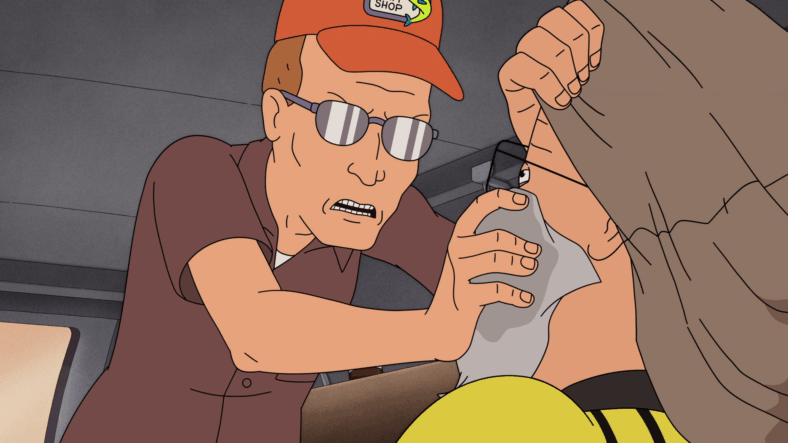 Dale (Johnny Hardwick) abducts Hank (Mike Judge) for Soccer-related questioning in King of the Hill Season 14 Episode 5 “New Ref in Town” (2025), Disney/Hulu
Dale (Johnny Hardwick) abducts Hank (Mike Judge) for Soccer-related questioning in King of the Hill Season 14 Episode 5 “New Ref in Town” (2025), Disney/Hulu
A veteran television producer whose credits include Frasier, Psych, and the 2021 The Wonder Years revival, Patterson spoke to the reason for the Hills’ return during a recent post-premiere interview given to The Hollywood Reporter‘s Abbey White.
Met at the top of their time together as to why he felt now was the right time to bring back King of the Hill, the showrunner recalled how his interest in the series stemmed from the comedic potential inherent in a ‘fish out of water’ meeting between the Hank Hill’s ‘Reagan Republican’ sensibilities and today’s ever-polarized political climate:
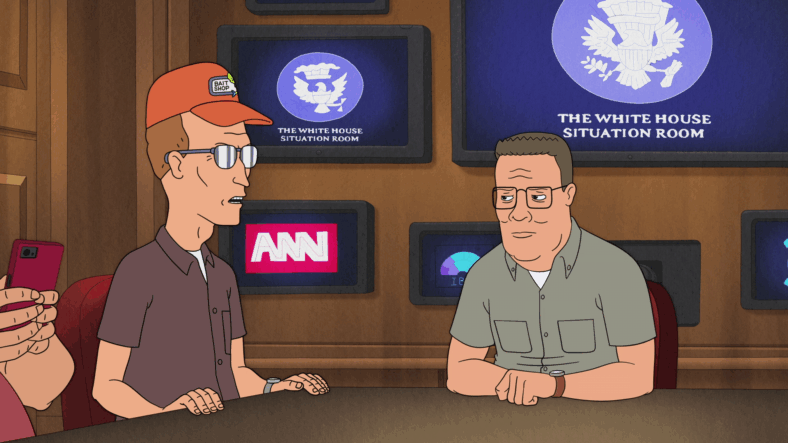 Hank (Mike Judge) is unenthused about Dale’s (Johnny Hardwick/Toby Huss) in King of the Hill Season 14 Episode 3 “Chore Money Chore Problems” (2025), Disney/Hulu
Hank (Mike Judge) is unenthused about Dale’s (Johnny Hardwick/Toby Huss) in King of the Hill Season 14 Episode 3 “Chore Money Chore Problems” (2025), Disney/Hulu
“To answer ‘why now?’, which is the most important question, for The Wonder Years, we were living in a time when the story of the Black middle class during the Civil Rights Movement hadn’t been told in that way before. The parallels between what was going on in society in the country in the late ‘60s and what was going on in the early 2020s were so in your face. It felt like good commentary to look back and to be able to look at the present in a somewhat similar way, but not quite as charged.
“With King of the Hill, when I sat down with [series co-creators] Mike [Judge] and Greg [Daniels] and they were meeting with me to potentially be the showrunner, I told them the things that stood out to me about why it was interesting to do this reboot now. In the original, the character of Hank Hill had a strong point of view, and was a very strong character known for representing a common sense middle ground.
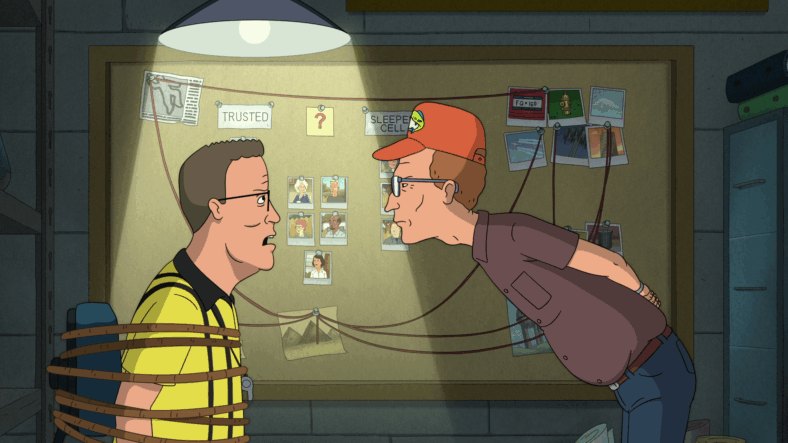 Dale (Johnny Hardwick) accuses Hank (Mike Judge) of being brainwashed by Big Soccer in King of the Hill Season 14 Episode 5 “New Ref in Town” (2025), Disney/Hulu
Dale (Johnny Hardwick) accuses Hank (Mike Judge) of being brainwashed by Big Soccer in King of the Hill Season 14 Episode 5 “New Ref in Town” (2025), Disney/Hulu
“Whether you lean left or right, Hank always represented the common sense middle that satirized the extremes. But Hank was the one that was bringing the extremes towards the middle, and realized we can all agree on certain things. The backstory they came up with — which I think was very smart — was of sending Hank and Peggy away to Saudi Arabia to work on the Aramco base for about 10 years King of the Hill time then bringing Hank back to a community and country that has changed some. What I thought was smart about that is that Hank hasn’t changed that much. He comes back, but his common sense middle ground is not the middle anymore. The extreme has moved so far to the extreme that to them, Hank’s common-sense middle-ground looks like the other extreme now.
“That felt like a good opportunity to make some good cultural social commentary. I specify ‘cultural’ because a lot of people, probably me included, when we talk about the original, tended to say it was a political show that made political commentary. That’s really us projecting on the King of the Hill what we think and feel. The original touched upon politics sometimes, but the social commentary was more cultural. It’s more about a father raising a son, but society now saying how you raise a boy is different; a culture saying how you treat a woman is different. That was where the show was, but it’s also small relatable stories through the points of view of our characters. That’s what we wanted to make sure we maintain with this one. And taking the opportunity that we can now have our main character have a totally different not only view of culture, but way the culture views him. That’s where a lot of the comedic conflict comes from.”
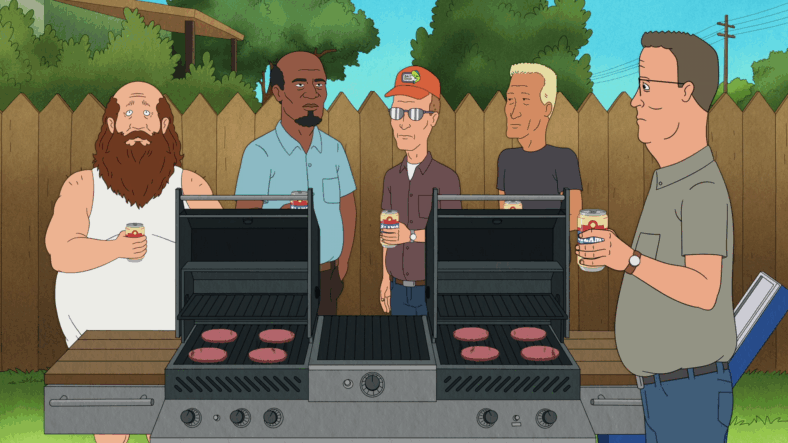 Bill (Stephen Root), Brian (Keith David), Dale (Johnny Hardwick), Boomhauer (Mike Judge) and Hank (Mike Judge) reunite for their first cook out in a long while in King of the Hill Season 14 Episode 1 “Return of the King” (2025), Disney/Hulu
Bill (Stephen Root), Brian (Keith David), Dale (Johnny Hardwick), Boomhauer (Mike Judge) and Hank (Mike Judge) reunite for their first cook out in a long while in King of the Hill Season 14 Episode 1 “Return of the King” (2025), Disney/Hulu
Following his lengthy response, Patterson was then asked if he could speak to both “the central comedic tension of the original series” and if it “stayed the same or change at all for this return?”
In turn, Patterson opted to answer “by using an example from the original”:
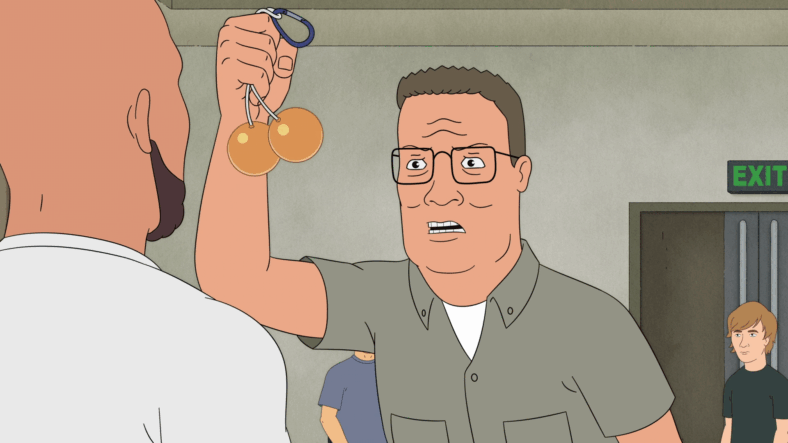 Hank (Mike Judge) refuses to buy the ‘alpha male’ crap Elias Selwick (Diedrich Bader) is selling in King of the Hill Season 14 Episode 9 “No Hank Left Behind” (2025), Disney/Hulu
Hank (Mike Judge) refuses to buy the ‘alpha male’ crap Elias Selwick (Diedrich Bader) is selling in King of the Hill Season 14 Episode 9 “No Hank Left Behind” (2025), Disney/Hulu
“One of the quotes that always stands out to me was from the episode where Khan (Ronny Chieng) and Minh (Lauren Tom) first move in next door, and then Hank and Khan immediately butt heads because Khan is an asshole. Hank’s point of view is, ‘What kind of country is this where I can only hate a man if he’s white?’ That speaks a lot to the irony that a character like Hank will find himself in. People will project onto Hank as a white man of a certain age at that time being Republican — he wouldn’t be called a Republican now — and living in Texas a lot of things that they think they know about him. So that when he does something, it’s interpreted based on what people think a character like him would feel.”
“But his point of view is, ‘No, no, I don’t hate him because I’m racist. I hate him because he is an asshole.’ That’s where a lot of rich comedic irony lives, and that’s what I wanted to make sure we carried over into this version of it — putting Hank in situations where people are going to accuse him or judge him or make assumptions that are based on who they think he is, or who they think he’s supposed to be, and not based on who he actually is. Now he has to prove himself to be different, while not changing what he’s done. That’s very interesting to me, and that’s where I think the show lives when it lives at its best comedic potential.”
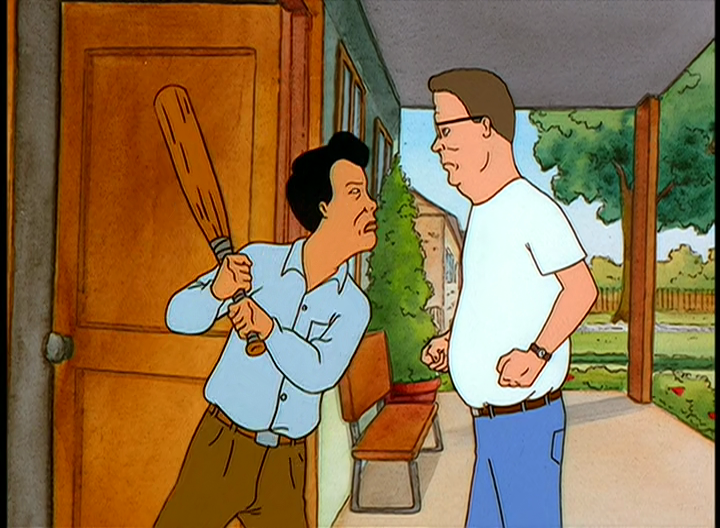 Kahn (Toby Huss) and Hank (Mike Judge) nearly come to blows over their respective dogs in King of the Hill Season 1 Episode 7 “Westie Side Story” (1997), Fox
Kahn (Toby Huss) and Hank (Mike Judge) nearly come to blows over their respective dogs in King of the Hill Season 1 Episode 7 “Westie Side Story” (1997), Fox
On this note, the showrunner was later pressed as to his approach to writing the series’ resident conspiracy theorist Dale Gribble, especially at a time when far too many individuals are finding themselves willingly buying in to some of the world’s more fringe beliefs, to which he replied by recalling how said proprietor of Dale’s Dead Bugs was actually a key piece in exploring the current state of US political discourse:
When I first met with Greg and Mike and we talked about how I would approach showrunning, I used Dale as an example because I felt the strength of the show and addressing the why now of it all is that Hank stays the same Hank, but his middle is not the middle anymore. Dale staying the same Dale was a way to passively make social commentary about how crazy reality has become to where now people take conspiracy theories much more extremely than Dale and treat them as fact and truth to where Dale can be the one to point and say, ‘I’m not that crazy.’
“That is such a unique position for Dale to be in, even though he’ll always be the craziest. And we get our comedic conflict and his conflict with Hank from that. Living in the world where Dale’s not the craziest person in the world is just a new thing for Hank to experience, too, which we tried to tap into with the Bush Library stuff. I was of the opinion, let’s leave Dale where he is because that gives us an opportunity to in and of itself make a statement.”
 Dale (Johnny Hardwick)recalls in King of the Hill Season 14 Episode 1 “Return of the King” (2025), Disney/Hulu
Dale (Johnny Hardwick)recalls in King of the Hill Season 14 Episode 1 “Return of the King” (2025), Disney/Hulu
More About:TV Shows